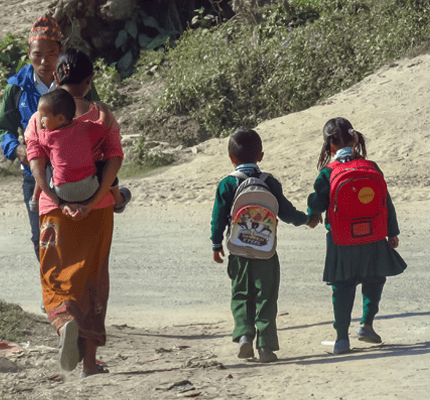
Sex Work and Motherhood in Nepal
Sex workers are often subjected to stigma and discrimination, as some people view these workers’ occupation as immoral or think that they carry and spread disease. In contrast, mothers are an accepted identity in society. Women who are sex workers, however, may be both mothers and sex workers simultaneously. In a new article published in NCA’s Journal of International and Intercultural Communication, Iccha Basnyat addresses the dual identities of women sex workers as mothers and sex workers in Nepal.
The study was conducted in Bhaktapur, near Kathmandu, Nepal. Basnyat interviewed 35 women sex workers for 45 minutes to 90 minutes. The workers ranged in age from 32 to 45 and lived with their children, who were between the ages of 3 and 18. Although all were married, none lived with their husband or their husband’s family.
Three themes emerged from the interviews: real work vs. sex work, fulfilling motherhood, and struggles and survival. The interviews indicated that sex work is part of how these women fulfil their identity as mothers, because sex work allows them to care for their families.
Real work vs. sex work
In interviews, the women referred to sex work as Pesa, a “respectful and legitimate means of earning a living.” But, according to the participants, they faced stigma on a daily basis. One participant described their experience bribing police: “We are selling our body in this Pesa so why give to others [referring to bribes], but if we don’t do that then we will meet with more policemen hassle, arrest and trouble all the time. Sometimes they arrest you and take all your money and so when you get to jail you have no money to get out.” Other women described the struggle to be professional in their work, while facing stigma and discrimination.
Some women discussed how they used their identities as mothers to navigate the risks associated with sex work. A woman who worked as a street sex worker described the physical dangers of sex work: “I was standing at the bus terminal. Suddenly someone pulled me and started to drag me. Then that person called the police van over. Along with me, others were pushed inside the van. We told them, we have children; we don’t have husbands, or homes. We need to work in this Pesa. We begged them to let us go to our children.” Many of the women faced threats from police or customers but reiterated that they needed the work to support their children.
Fulfilling motherhood
The women identified as working mothers. Thus, according to Basnyat, they are simultaneously performing identities as “good mothers” by prioritizing the needs of their children and violating norms associated with being a “good mother” by serving as sex workers. One woman described the problems of navigating working motherhood: “Most domestic work or any kind of labor work [employers] will tell you they don’t want to give work to mothers with small children. Finding other work is the biggest solution but if there is no other option then naturally this Pesa is followed. We don’t need to eat fancy; a simple meal would be enough if we could find a job that would allow us to earn enough to educate [our] children, feed them and take care of them.” For many of the women, as for this participant, sex work is about survival.
Women also prioritized their children’s education and described working to care for their children alone, without familial support. According to Basnyat, the women “have a clear sense of agency to navigate and perform both roles [as sex worker and accepted mother].” One woman said, “I didn’t get a chance to get an education. Even if I am not educated, I still have this Pesa. From this, I can educate my children, I can keep a roof over their heads, and I can feed them, take care of them. There is nothing for me but at least I have work. I can stand on my own two feet and take care of my children.” Basnyat argues that the women follow the norms of motherhood by providing for their children financially; although they provide for their children through stigmatized sex work, this does not compromise their identities as mothers.
Struggles and survival
Women’s sex work is also tied to social practices that limit women’s rights. In Nepal, women’s citizenship is granted through their fathers or husbands. Without citizenship, women may struggle to get jobs. One woman said, “I started this Pesa because [my] husband was abusive. He took my citizenship and wouldn’t give it to me. He kept it, so he wouldn’t have to give me any land or inheritance for my children. I am not educated, I don’t know how to write my name. I was afraid to look for other jobs because I don’t have my citizenship card.”
Basnyat also discusses the myriad ways that women navigate their identities as sex workers, including trying to conceal this identity from others, such as their children. Although all the sex workers in the study were married, they were living alone and were the sole providers for their children. To avoid the stigma associated with sex work, some claimed that their husbands were migrant workers; thus, they were able to explain both their husbands’ absence and their income, without claiming the stigmatized identity of sex worker.
In addition, some sex workers worried about what would happen when their children realized what they did for a living. Despite those concerns, participants conveyed their pride in working on behalf of their children’s best interests: “I have struggled, I have gotten beaten so many times, I have faced so many things, but I am proud because my son is in 12th grade now and my daughter is in 5th grade. Education is everything.”
Conclusion
Basnyat concludes that the women sex workers in the study used their agency in choosing sex work to provide for their families and in choosing to define sex work as a Pesa that they undertook to give them the ability to care for their children. In doing so, the women showed that they were not defined by the stigmatized identity of sex worker, but rather defined themselves as working mothers.


